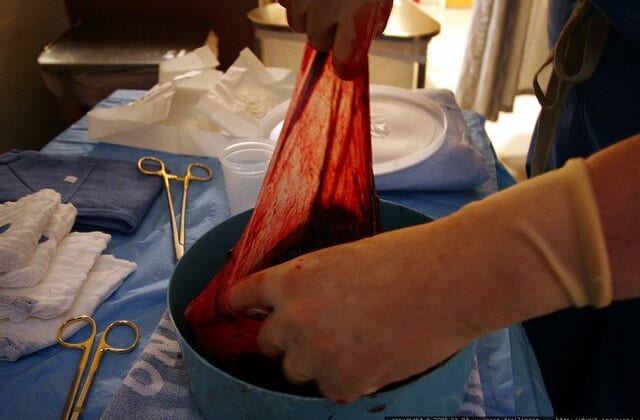
Sometimes, according to my colleagues, the patients desire to keep the placentas for cultural reasons. However, I never realized that increasingly, many new moms actually want to eat them.
Therefore, I was quite surprised to see a recent in-depth feature in New York Magazine called “The Placenta Cookbook.”
Besides introducing some of the people who take part in this trend, the article contains anecdotal recipes and tips to enjoy the afterbirth delicacy and even shares step-by-step instructions on how to prepare placental capsules to preserve the nutritive power of the tissue.
Beyond the article, various websites also exist where mothers discuss how to drain the blood from the tissue, the amount of time it should be cooked for, and recipes ranging from roast placenta to placenta lasagna.
The growing popularity of this phenomenon has to do with some non-scientific belief that consuming the placenta may offer a new mother certain health benefits. For example, some people believe that the placenta can help with the treatment of postpartum depression, or “baby blues.”
It has been suggested in the past that postpartum depression in some patients is spurred by the quickly shifting levels of female hormones after giving birth, and that by eating the placenta, the hormones will stabilize and postpartum depression can therefore be prevented.
Also, others say that the placenta can offer some degree of pain relief due to certain chemicals contained within the tissue. Placental extracts are commonly offered for pain in Chinese medicine.
As it turns out, humans are actually one of the only mammals that don’t regularly eat their own placentas. Some researchers believe it must be because the placenta offers some fundamental biological advantage. The placenta is known to contain high levels or iron, vitamin b-12 and other hormones.
But before jumping on the placenta bandwagon, I must admit that I myself have failed to find any concrete benefits to eating your own placenta. The medical community rarely comments on this practice, to be honest.
In hospitals, the placenta has always seen as a biohazardous material. Remember that this is human tissue, and in theory, it could carry infectious diseases.
However, I know that there are many hospitals nowadays that are very actively looking into what their procedures should be if a patient requests her own placenta. Do the doctors give it to her? Do they package it neatly and present it along with the newborn baby?
I have to say, from what I’m seeing lately, it appears that as long as certain medical criteria are met – such as both the patient and placenta being healthy – that many hospitals will comply with the request.
Now, I’m not a lawyer, but I don’t think there are any legal statutes that would apply that would prevent a mother from taking a placenta. Certainly there have been isolated cases where patients have been denied their placentas and challenged the hospitals. In Las Vegas a few years ago, Anne Swanson took her case to the courts and won the right to take her placenta home.
So, this is my final take: If you want to eat your placenta because you believe in its supposed health benefits, go right ahead. Just be aware that this material has to be handled with care, and you have to protect those around you from being exposed to any tissue waste that you may find unsuitable for consumption.
Also, remember that there are no scientifically proven health benefits at this time, at least not in the present literature, and I don’t expect there will be any randomized studies coming out on this subject any time soon.
Finally, please, keep it away from my dinner table.
